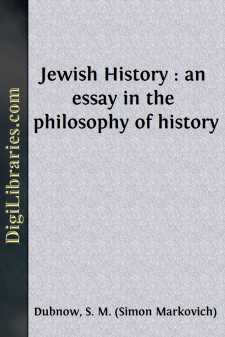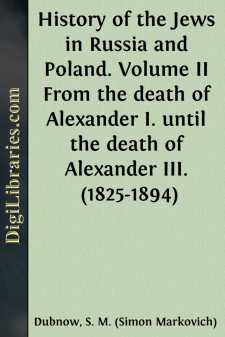Categories
- Antiques & Collectibles 13
- Architecture 36
- Art 48
- Bibles 22
- Biography & Autobiography 813
- Body, Mind & Spirit 142
- Business & Economics 28
- Children's Books 17
- Children's Fiction 14
- Computers 4
- Cooking 94
- Crafts & Hobbies 4
- Drama 346
- Education 46
- Family & Relationships 57
- Fiction 11829
- Games 19
- Gardening 17
- Health & Fitness 34
- History 1377
- House & Home 1
- Humor 147
- Juvenile Fiction 1873
- Juvenile Nonfiction 202
- Language Arts & Disciplines 88
- Law 16
- Literary Collections 686
- Literary Criticism 179
- Mathematics 13
- Medical 41
- Music 40
- Nature 179
- Non-Classifiable 1768
- Performing Arts 7
- Periodicals 1453
- Philosophy 64
- Photography 2
- Poetry 896
- Political Science 203
- Psychology 42
- Reference 154
- Religion 513
- Science 126
- Self-Help 84
- Social Science 81
- Sports & Recreation 34
- Study Aids 3
- Technology & Engineering 59
- Transportation 23
- Travel 463
- True Crime 29
Jewish History : an essay in the philosophy of history
Description:
Excerpt
INTRODUCTORY NOTE
I
THE RANGE OF JEWISH HISTORY
Historical and Unhistorical Peoples
Three Groups of Nations
The "Most Historical" People
Extent of Jewish History
II
THE CONTENT OF JEWISH HISTORY
Two Periods of Jewish History
The Period of Independence
The Election of the Jewish People
Priests and Prophets
The Babylonian Exile and the Scribes
The Dispersion
Jewish History and Universal History
Jewish History Characterized
III
THE SIGNIFICANCE OF JEWISH HISTORY
The National Aspect of Jewish History
The Historical Consciousness
The National Idea and National Feeling
The Universal Aspect of Jewish History
An Historical Experiment
A Moral Discipline
Humanitarian Significance of Jewish History
Schleiden and George Eliot
IV
THE HISTORICAL SYNTHESIS
Three Primary Periods
Four Composite Periods
V
THE PRIMARY OR BIBLICAL PERIOD
Cosmic Origin of the Jewish Religion
Tribal Organization
Egyptian Influence and Experiences
Moses
Mosaism a Religious and Moral as well as a Social and Political
System
National Deities
The Prophets and the two Kingdoms
Judaism a Universal Religion
VI
THE SECONDARY OR SPIRITUAL-POLITICAL PERIOD
Growth of National Feeling
Ezra and Nehemiah
The Scribes
Hellenism
The Maccabees
Sadducees, Pharisees, and Essenes
Alexandrian Jews
Christianity
VII
THE TERTIARY TALMUDIC OR NATIONAL-RELIGIOUS
PERIOD
The Isolation of Jewry and Judaism
The Mishna
The Talmud
Intellectual Activity in Palestine and Babylonia
The Agada and the Midrash
Unification of Judaism
VIII
THE GAONIC PERIOD, OR THE HEGEMONY OF THE ORIENTAL JEWS (500-980)
The Academies
Islam
Karaism
Beginning of Persecutions in Europe
Arabic Civilization in Europe
IX
THE RABBINIC-PHILOSOPHICAL PERIOD, OR THE HEGEMONY OF THE SPANISH
JEWS (980-1492)
The Spanish Jews
The Arabic-Jewish Renaissance
The Crusades and the Jews
Degradation of the Jews in Christian Europe
The Provence
The Lateran Council
The Kabbala
Expulsion from Spain
X
THE RABBINIC-MYSTICAL PERIOD, OR THE HEGEMONY OF THE GERMAN-POLISH
JEWS (1492-1789)
The Humanists and the Reformation
Palestine an Asylum for Jews
Messianic Belief and Hopes
Holland a Jewish Centre
Poland and the Jews
The Rabbinical Authorities of Poland
Isolation of the Polish Jews
Mysticism and the Practical Kabbala
Chassidism
Persecutions and Morbid Piety
XI
THE MODERN PERIOD OF ENLIGHTENMENT (THE NINETEENTH CENTURY)
The French Revolution
The Jewish Middle Ages
Spiritual and Civil Emancipation
The Successors of Mendelssohn
Zunz and the Science of Judaism
The Modern Movements outside of Germany
The Jew in Russia
His Regeneration
Anti-Semitism and Judophobia
XII
THE TEACHINGS OF JEWISH HISTORY
Jewry a Spiritual Community
Jewry Indestructible
The Creative Principle of Jewry
The Task of the Future
The Jew and the Nations
The Ultimate Ideal
INTRODUCTORY NOTE
What is Jewish History?...



